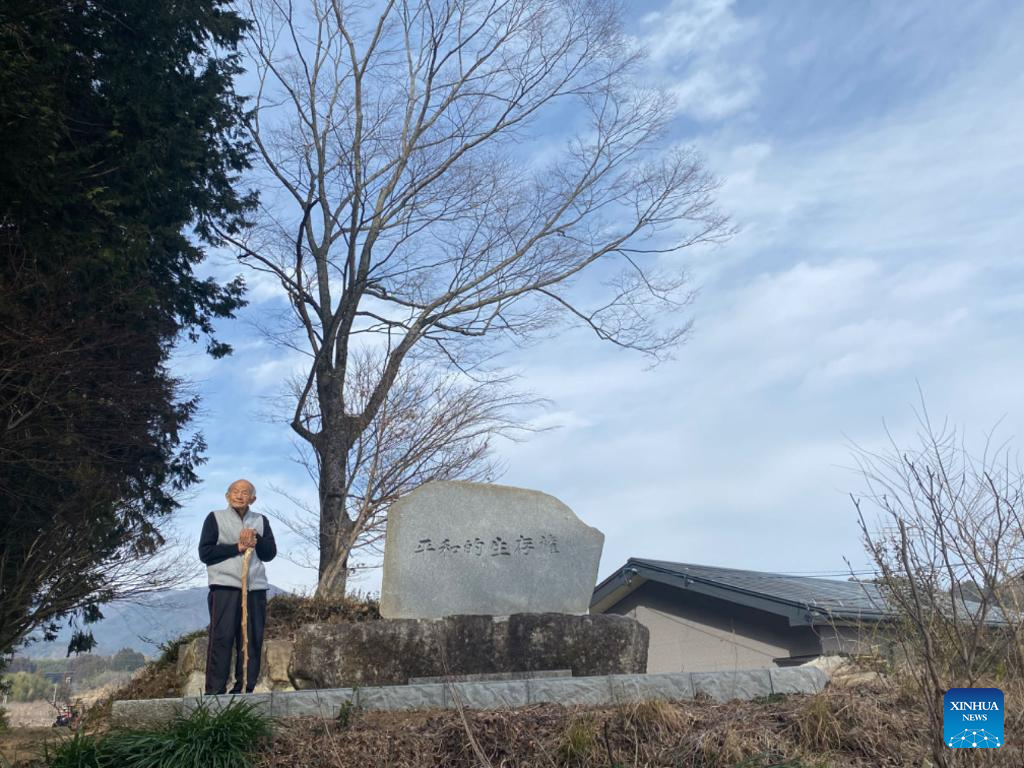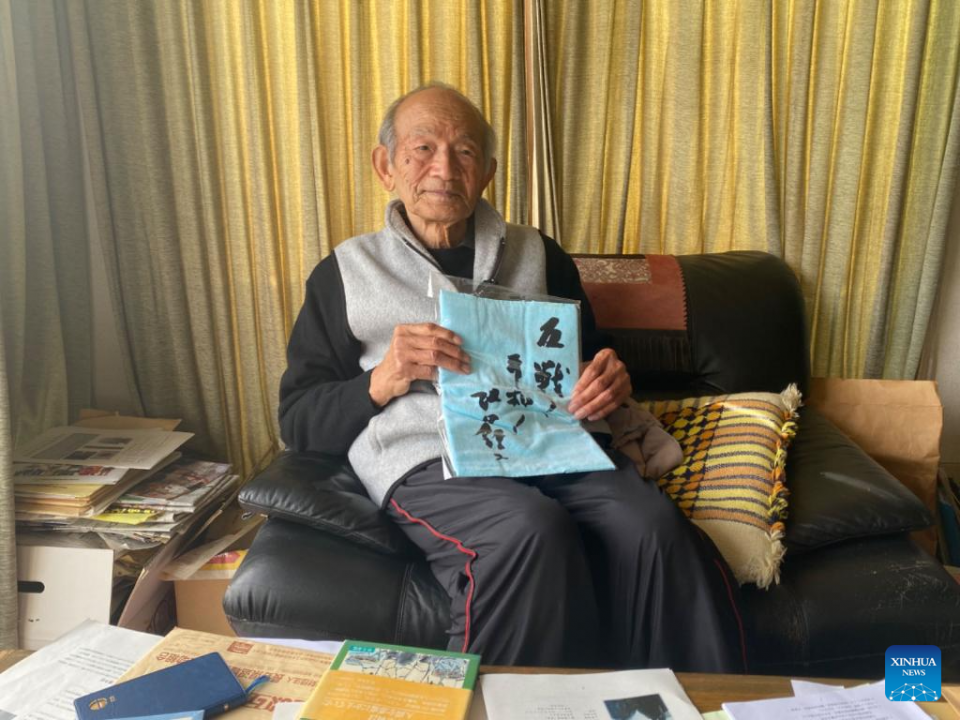
Noboru Kubota, former chairman of the Shinshu War Exhibition for Peace Organizing Committee and the Iida City Peace Material Collection Committee, poses for a photo in front of his home in Iida City, Japan, Jan. 13, 2023. (Xinhua/Guo Dan)
TOKYO, Sept. 2-- In 1991, or 32 years ago, Masakuni Kurumizawa, a former member of the notorious Japanese germ warfare army Unit 731, was overwhelmed with guilt and remorse when he handed over the scalpel he used for live human dissections to his fellow countryman Noboru Kubota.
"I used this scalpel to perform vivisections. I did things that no human should do!" said Kurumizawa, a veteran who served at the unit during World War II (WWII).
Kubota, former chairman of the Shinshu War Exhibition for Peace Organizing Committee and the Iida City Peace Material Collection Committee, may never forget what Kurumizawa told him that day.
The 93-year-old man has long been advocating for the truth about Unit 731's atrocities during WWII in Japan. It was under his encouragement that Kurumizawa in 1991 publicly disclosed his vivisection experiences when serving Unit 731.
"I was involved in the dissection of 300 live human bodies. I took part in 100 cases as an assistant and as the lead surgeon in 200 others," Kurumizawa said.
The bacteriology unit killed thousands of Chinese civilians and prisoners of war at its sprawling complex in the northeastern Chinese city of Harbin, from the late 1930s to the end of the war.
The victims, referred to in Japanese as "marutas", or wooden logs, were deliberately infected with typhus, typhoid, cholera, anthrax and plague in addition to many other bacterial diseases to serve the goal of perfecting biological weapons. Some prisoners were then vivisected without anesthetic so that researchers could observe the effects of the disease on the human body.
TRUTH-RESTORING DREAMS SHATTERED
Since 1991, the dream of establishing a permanent exhibition to display the evidence and testimonies of Unit 731 members and to reveal the historical truth of Japan's bacteriological warfare during WWII has been shared by Kubota and members of the Shinshu War Exhibition for Peace Organizing Committee.
Despite their efforts over the past three decades, their dream has yet to be realized.
In 2015, the Iida City Peace Memorial Museum Archives Room was established in Nagano Prefecture. In May 2022, the peace memorial museum funded by the Iida City government was completed, leaving Kubota and his fellows deeply moved as it seemed what they dreamt of for decades was to become a reality.
However, the Iida City Board of Education in June 2022 suddenly informed them that panels related to Unit 731 could not be displayed in the museum just as the staff were preparing to move such panels into the exhibition hall.
Furthermore, it demanded that the term "Nanjing Massacre" be replaced with "Nanjing Incident," which instantly shattered the hopes of Kubota and other Japanese peace advocates.
"Have our 30 years of collecting and organizing Unit 731 evidence and testimonies disappeared like this? How can you imagine that these scalpels were used for the vivisections of 300 people (if not exhibited in the museum)?" said Akira Yoshizawa and Hideaki Hara, both retired high school history teachers, expressing their outrages upon learning the decision by the board.
Hideo Shimizu, now 93 and a former member of Unit 731 Youth Corps, had seen various dissected human organs soaked in formaldehyde in the specimen room at the Unit 731 headquarters.
The personal experiences of Shimizu, the surgical instruments at Unit 731 brought back by Kurumizawa, books with stamps of "Ishii Unit", under the name of which Unit 731 was operated for bacteriological research, and Kurumizawa's testimonies regarding Unit 731's crimes verified by other witnesses -- all these proofs help to expose the unit's atrocities in China, including bacteriological warfare and vivisections, but they are now still not allowed to go public.
WHO IS HIDING WAR CRIMES?
Ignoring the overwhelming evidence, the Iida City Board of Education still holds its ban on exhibiting Unit 731 panels at the peace memorial museum.
Yoshizawa told Xinhua that the board had presented a 2003 "National Diet response record" and referred to it as the so-called "national standpoint, " which stated that "although the Japanese government acknowledges the existence of Unit 731, it does not acknowledge the fact that the unit engaged in bacteriological warfare."
This so-called "national standpoint" has been refuted by Japanese experts, including Fumio Hara, former president of the Research Society for 15 years War and Japanese Medical Science and Service.
Well-versed in the Unit 731 crimes, Hara wrote a letter to the board, criticizing their so-called "national standpoint" as fundamentally untenable.
"In a judgment in August 2002, the Tokyo District Court recognized that Unit 731 had used bacteriological weapons on the Chinese battlefield. While the judgment rejected the plaintiff's demands for an apology and compensation, it unequivocally recognized the fact that the Japanese military had engaged in bacteriological warfare. This is an official judgment of the Japanese government," said Hara.
"This is concealing and hiding history, depriving citizens of the opportunity to understand historical truths!" said Nobuharu Goi, a representative of Japan's civic group 731 Alliance, condemning in a letter sent to the board its decision to ban the exhibition of Unit 731 crimes.
In another letter sent to the board, another citizens group questioned: "The testimonies and evidence of Unit 731 witnesses are extremely valuable. Isn't it our generation's responsibility to display the testimony of the perpetrators and prevent the horrors of war from happening again?"
After several dialogues with the board failed, the Iida City Peace Material Collection Committee in January 2023 established a committee for reflecting on the Iida City Peace Memorial Museum.
During its inaugural meeting, Kubota took the stage, wearing a hearing aid, and stated, "The memorial museum must display panels related to Unit 731. We must fight for this! The core issue here is how we address the war, both as perpetrators and victims."
"The current Japanese government no longer allows any mention of war atrocities," lamented 93-year-old Hideo, who reiterated his personal experiences within Unit 731 at the gathering.
Under huge pressure, the Iida City Board of Education in February 2023 organized a meeting to discuss the Unit 731 panels. However, the conclusion was that "the content on the exhibition panels is too cruel and goes beyond the scope of Japanese school textbooks."
When asked to comment on the issue, Hara noted that Japan's school curriculum scarcely addresses the negative aspects of its wartime aggression, making it exceedingly difficult to present the historical truth of Japan's wartime atrocities in society and educational institutions.
Incidents similar to the suppression of historical truths through exhibition panels are not confined to Iida City, he said, noting that the practice of concealing Japan's wartime crimes has gradually spread throughout the country.
The expert, citing the "Peace Osaka" event for example, told Xinhua that due to pressure from right-wing forces, its panels related to crimes like the Nanjing Massacre and Unit 731 were removed. Similarly, the Statue of a Girl of Peace symbolizing "comfort women" victims was removed from an international art exhibition in Aichi Prefecture in 2019.
CALL FOR FACING UP TO HISTORY
Today, the exhibition hall under the title of "Brutality of War" at the Iida City Peace Memorial Museum remains conspicuously devoid of Unit 731-related exhibition panels.
The empty walls serve as a stark reminder of a history left unspoken.
In late July, the Committee for Reflecting on the Iida City Peace Memorial Museum held a study meeting, where Katsuo Nishiyama, a germ warfare scholar and professor emeritus at Shiga University of Medical Science, was invited to expose the crimes of Unit 731.
Kubota and Shimizu also attended the meeting to call on the Japanese government to face up to history.
At the meeting, Yoshizawa reported on their fight with the city's board of education -- While eight panels introducing Unit 731 are still not allowed for display, the board's current proposal is to use one single panel to introduce the Tokyo District Court's judgment regarding Unit 731's involvement in bacteriological warfare.
"However, the contents related to the live human experiments conducted by Unit 731, as well as the testimonies of witnesses like Kurumizawa and Shimizu, are still prohibited," he said.
"What Japan waged during WWII was an aggressive war, and Unit 731's deeds were the most horrifying. But Japan has never truly reflected on this, which has resulted in a vague understanding of this history and even influenced local governments," said Kubota.
"This is the fundamental reason behind the Iida City Board of Education's refusal to display Unit 731 panels!" he said.
A survey conducted by Japanese newspaper Asahi Shimbun revealed that only 30 percent of the 85 WWII-related museums across Japan have long-term exhibits regarding the nation's history of aggression. None of them has exhibits dedicated to Unit 731.
"Cover it up, then forget it without realizing it... The nation's attitude of making true history vanish is fully evident in the acts of the Iida City Board of Education," said Kubota, expressing profound sorrow amid the Japanese government's attempts to conceal the truth of its wartime aggression.
"We must not let the true history disappear," said the gray-haired man, leaning on his cane. ■

Noboru Kubota, former chairman of the Shinshu War Exhibition for Peace Organizing Committee and the Iida City Peace Material Collection Committee, receives an interview with Xinhua at home in Iida City, Japan, Jan. 13, 2023.












